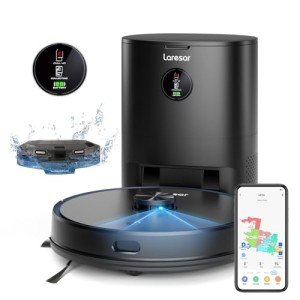How To Solve Issues Related To Autonomous Vacuum
The Rise of Autonomous Vacuums: Revolutionizing Home Cleaning
In the age of technology, household chores are becoming significantly automated, and one of the most notable improvements in this world is the autonomous vacuum. These intelligent cleaning robots are designed to alleviate the drudgery of conventional vacuuming, making them popular among time-strapped homes. This article checks out the advancement, performance, benefits, and restrictions of autonomous vacuums, along with a contrast of some of the leading designs on the market today.
What is an Autonomous Vacuum?
An autonomous vacuum, likewise called a robotic vacuum cleaner, is a small, automatic gadget that navigates through your home to tidy floorings without human intervention. Equipped with sensors, electronic cameras, and advanced software, these vacuums can spot challenges, avoid stairs, and enhance cleaning courses. They typically run from a rechargeable battery, returning to their charging stations when their power is low or when cleaning jobs are completed.
Secret Features of Autonomous Vacuums
Smart Navigation:
- Utilizes sensing units and algorithms to map the environment.
- Can navigate complex layouts and prevent challenges.
Scheduling:
- Allows users to set cleaning times.
- Can run when your home is empty, making sure minimal disruption.
Connectivity:
- Many designs connect to Wi-Fi, enabling app control and combination with wise home systems.
- Users can personalize settings, check cleaning status, and get notices through mobile applications.
Suction Power:
- Varies between designs; some deal adjustable suction settings for various floor types.
- High-end models include powerful suction capable of getting animal hair and deep dirt.
Floor Type Adaptability:
- Capable of cleaning carpets, wood, tiles, and more.
- Particular designs specialize in customized cleaning for multiple surfaces.
The Advantages of Using Autonomous Vacuums
1. Time-Saving
One of the most significant benefits of autonomous vacuums is the amount of time they save. Rather than spending best robot vacuum cleaner UK pressing a conventional vacuum, homeowners can set robotic vacuums to tidy while they are taken part in other activities.
2. Consistent Cleaning Schedule
With the capability to schedule cleanings, these vacuums make sure that areas are regularly cleaned, resulting in a cleaner home in general. Regular cleaning helps preserve indoor air quality, particularly for families with allergic reactions or asthma.
3. Smart Home Integration
Many autonomous vacuums can be incorporated with wise home systems for smooth operation. Homeowners can control their vacuums by means of voice commands through gadgets like Amazon Alexa or Google Assistant, improving user benefit.
4. Compact Design
The slim profile of these devices enables them to clean under furniture, such as couches and beds, where standard vacuums frequently can not reach.
5. Pet-Friendly
For animal owners, autonomous vacuums can be a game-changer, as they are frequently geared up with specialized features for picking up pet hair and dander, contributing to a cleaner home environment.
Limitations of Autonomous Vacuums
In spite of their numerous benefits, autonomous vacuums likewise have constraints:
1. Limited Deep Cleaning
While these vacuums efficiently keep cleanliness, they may not replace the efficiency of a deep tidy provided by traditional vacuums, especially for greatly soiled locations.
2. Capacity Constraints
A lot of autonomous vacuums featured small dust bins that require to be emptied often, specifically in bigger homes or homes with animals. This can be a trouble for some users.
3. Navigation Challenges
Although navigation innovation is continuously enhancing, some designs may have a hard time with particular layouts, especially intricate spaces with many obstacles or really small spaces.
4. Price Point
While rates have ended up being more accessible, high-end models can still be rather pricey, positioning a barrier for some customers.
Contrast of Top Autonomous Vacuum Models
Model
Smart Features
Battery Life
Suction Strength
Cost Range
iRobot Roomba 980
App Control, Voice Assistant
120 minutes
1700 Pa
₤ 700 – ₤ 900
Roborock S6 MaxV
Advanced Mapping, Connectable
180 minutes
2500 Pa
₤ 600 – ₤ 800
Ecovacs Deebot Ozmo
Mopping, Smart Home
110 minutes
1500 Pa
₤ 450 – ₤ 700
Neato Botvac D7
Laser Navigation, Custom Zones
120 minutes
2000 Pa
₤ 800 – ₤ 900
Shark IQ Robot
Self-Emptying Base, Smart Map
90 minutes
1500 Pa
₤ 400 – ₤ 600
Notable Takeaways
- Smart Features: Consumers must focus on models providing robust wise features for benefit and efficiency.
- Battery Life: A longer battery life is beneficial for bigger living spaces.
- Suction Strength: Depending on household requirements, differing suction power can substantially affect cleaning efficiency.
FAQs about Autonomous Vacuums
Q1: How do I preserve my autonomous vacuum?
A: Regular upkeep includes cleaning the brushes, emptying the dustbin, and looking for obstructions. Furthermore, keeping the sensors clean up will help preserve navigation accuracy.
Q2: Can robotic vacuums clean carpets and carpets?
A: Yes, many robotic vacuums are created to successfully clean both hard surfaces and carpets. However, suction power might differ based upon the model.
Q3: Do robotic vacuums need Wi-Fi?
A: While numerous autonomous vacuums benefit from Wi-Fi connectivity for app control and updates, some designs can run independently without a wireless connection.
Q4: How typically should I run my robotic vacuum?
A: It depends upon your living circumstance, but running it a number of times a week is often advised, particularly for homes with family pets.
In conclusion, autonomous vacuums represent a considerable development in home cleaning technology, appealing benefit and efficiency. While these devices might not completely replace standard vacuum, they are unquestionably valuable in maintaining a tidy living environment. As innovation continues to develop, the future of home cleaning looks promising, and these devices are at the leading edge of the revolution.
